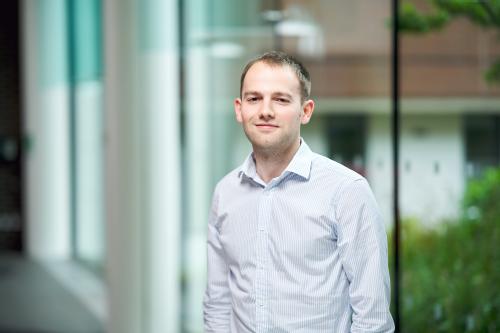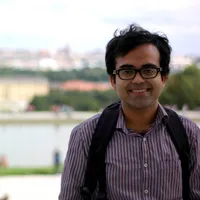Departmental news
Adam Shephard joins the TIA lab

Adam Shephard has just joined the department as a Research Fellow and is currently working in the Tissue Image Analytics (TIA) Lab on the ANTICIPATE project funded by Cancer Research UK. He has recently submitted his thesis on the application of deep learning to paediatric MRI at Aston University, under the supervision of Prof. Amanda Wood and Dr. Jan Novak. His role in the ANTICIPATE project will be concerned with the development and application of deep learning techniques to digitized histology slides to aid in the more efficient grading of head and neck tumours, to ultimately provide more accurate patient prognoses.
EPSRC funding success for Dr. Ramanujan Sridharan
 We are delighted to report that Dr Ramanujan Sridharan from the Theory and Foundations (FoCS) research theme at the Computer Science Department has received a prestigious EPSRC New Investigator Award. The approximately £264K project titled "New frontiers in Parameterizing Away From Triviality” aims to develop novel notions of graph edit distance and investigate their connections to efficient solvability of computationally hard problems.
We are delighted to report that Dr Ramanujan Sridharan from the Theory and Foundations (FoCS) research theme at the Computer Science Department has received a prestigious EPSRC New Investigator Award. The approximately £264K project titled "New frontiers in Parameterizing Away From Triviality” aims to develop novel notions of graph edit distance and investigate their connections to efficient solvability of computationally hard problems.the proposal identifies research questions that are novel, has the potential to have a broader impact both within and outside academia and it is an exciting project that will break new ground.
PETRAS SRF award to Dr Arshad Jhumka to investigate trust in IoT systems
Dr Arshad Jhumka from the department’s Artificial Intelligence research theme has been awarded a grant as PI, under the PETRAS SRF programme, to develop and deploy a trusted edge-based Internet of Things (IoT) network. IoT networks are expected to be deployed as solutions to problems in a wide variety of contexts, from non-critical applications such as smart city monitoring to providing support to emergency services such as critical communications. As IoT devices are resource constrained, execution of resource-hungry applications will be offloaded to edge networks for quick response. Such an infrastructure is open to cyber-attacks and needs to be resilient to attack.
EPSRC funding for Florin Ciucu
Florin Ciucu has been successful with a 491K EPSRC grant application ‘Practical Analysis of Parallel and Networked Queueing Systems’. The project will run for 4 years and will address some fundamental queueing problems at the core of modern computing and communication systems with parallel or network structures. The technical objective is to develop novel martingale-based models and techniques circumventing the historical Poisson assumption on the systems’ input, which has been convincingly shown to be highly misleading for practical purposes. The proposal was supported by IBM Research, Microsoft Research, and VMware.
DASA award to Dr Victor Sanchez to improve security at airports
Dr Victor Sanchez (PI) from the department's Artificial Intelligence research theme and Prof. Carsten Maple (Co-I) from Warwick Manufacturing Group have been further awarded a research grant by the Defence and Security Accelerator (DASA), which is part of the Ministry of Defence, to continue with Phase 2 of the project R-DIPS - "Real-time Detection of Concealment of Intent for Passenger Screening." The project, which began on October 2019 and ends on February 2021, aims at developing a machine learning and computer vision solution to track, in real-time, multiple individuals across a set of non-overlapping surveillance cameras to detect those with suspicious behaviours and movements within an airport. The project will improve the screening process of passengers to detect those attempting to mask nefarious intent. The R-DIPS project is an international collaboration with Prof. Chang-Tsun Li who is also affiliated with Deakin University, Australia.
EPSRC funding success for Prof. Yulan He
Prof. Yulan He from the department's Data Science and Human-Centred Computing research themes has been awarded a 3-year EPSRC grant to develop a new framework to study model/data uncertainty and model interpretability of AI systems. The interdisciplinary project will assist system stakeholders and developers to understand and reason about the (business, personal, social, etc.) impact of intelligent systems on the world in which they operate, and to understand how and why decisions are taken. It will run in collaboration with Dr. Ritabrata Dutta from the Statistics Department, and Dr. Nelly Bencomo and Prof. Pete Sawyer from Aston University.
New EPSRC award to support combating caller ID spoofing

Professor Feng Hao (PI) from the Department of Computer Science and Dr Adrian von Mühlenen (co-I) from the Department of Psychology have been awarded an EPSRC grant on “End to End Authentication of Caller ID in Heterogeneous Telephony Systems”. This project will support a research fellow and a senior research fellow in computer science, each for four years, to explore new ways to stop caller ID spoofing without requiring globally trusted authorities, in collaboration with researchers from the Department of Psychology. This project will also aim to develop impacts by engaging with the telecommunication industry via the project partners: Huawei, Truecall, and RedTone.
The award of this project coincided with the announcement in March 2020 by the Federal Communications Commission (FFC), who proposed mandating the adoption of STIR/SHAKEN for all telecom providers in the US in order to stop the caller ID spoofing scams. However, STIR/SHAKEN requires globally trusted authorities, which have been known to be difficult to manage. As opposed to the top-down approach by the FCC, this EPSRC project aims to take a bottom-up approach to develop more effective and more deployable solutions without relying on any globally trusted third parties.
A University press release on this project can be found here.
CRUK award to Dr Fayyaz Minhas for early detection of cancer
Dr Fayyaz Minhas of the Tissue Image Analytics (TIA) lab at the Computer Science department is a co-PI on a £97K grant by Cancer Research UK’s Early Detection Committee to explore machine learning for discovery of pre-neoplastic signature in mesothelioma. He will be working closely with the PI Dr Jan Lukas Robertus, who is a Senior Consultant Cardiothoracic Pathologist at the Royal Brompton Hospital. Dr Minhas will lead on the machine learning and computational pathology side of the project.
MRC funding success for Dr Yulia Timofeeva
 We are happy to announce that Dr Yulia Timofeeva from the department's Applied Computing research theme has been awarded a Medical Research Council grant to develop a modelling framework and computational tools for studying synaptic transmitter release in health and disease. The £475K project will run in close collaboration with the laboratory of Professor Kirill Volynski at the UCL Queen Square Institute of Neurology as well as other world-leading experimental laboratories in Europe, USA, Canada and Japan, specialising in state-of-the-art research in synaptic transmission.
We are happy to announce that Dr Yulia Timofeeva from the department's Applied Computing research theme has been awarded a Medical Research Council grant to develop a modelling framework and computational tools for studying synaptic transmitter release in health and disease. The £475K project will run in close collaboration with the laboratory of Professor Kirill Volynski at the UCL Queen Square Institute of Neurology as well as other world-leading experimental laboratories in Europe, USA, Canada and Japan, specialising in state-of-the-art research in synaptic transmission.
EPSRC funding success for Dr Sayan Bhattacharya
 We are pleased to report that Dr Sayan Bhattacharya from the Theory and Foundations research theme at the Computer Science Department has received an EPSRC New Investigator Award. This will allow him to lead a research project on the theory and applications of dynamic algorithms. The approximately £250K project will aim to develop new techniques to design algorithms for fundamental optimisation problems in a setting where the input data changes over time.
We are pleased to report that Dr Sayan Bhattacharya from the Theory and Foundations research theme at the Computer Science Department has received an EPSRC New Investigator Award. This will allow him to lead a research project on the theory and applications of dynamic algorithms. The approximately £250K project will aim to develop new techniques to design algorithms for fundamental optimisation problems in a setting where the input data changes over time.
The proposal was ranked top at its funding prioritisation panel, and the reviewers said:
The intended research explorations are of very high quality and will likely make a substantial impact on the research community; and possibly on the industrial sector.
